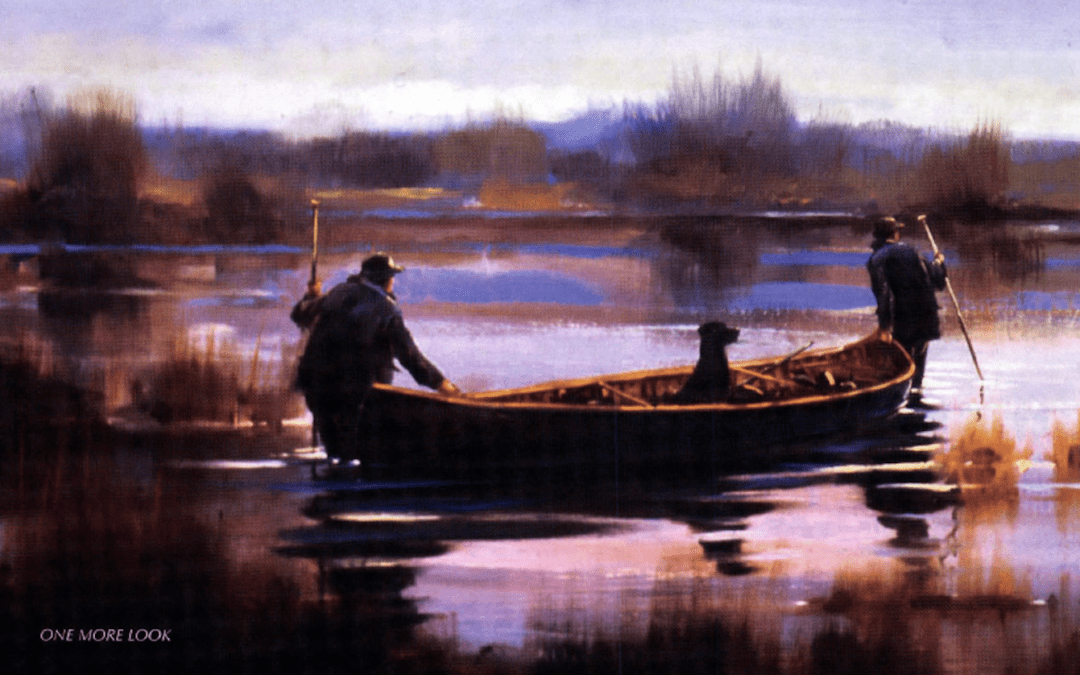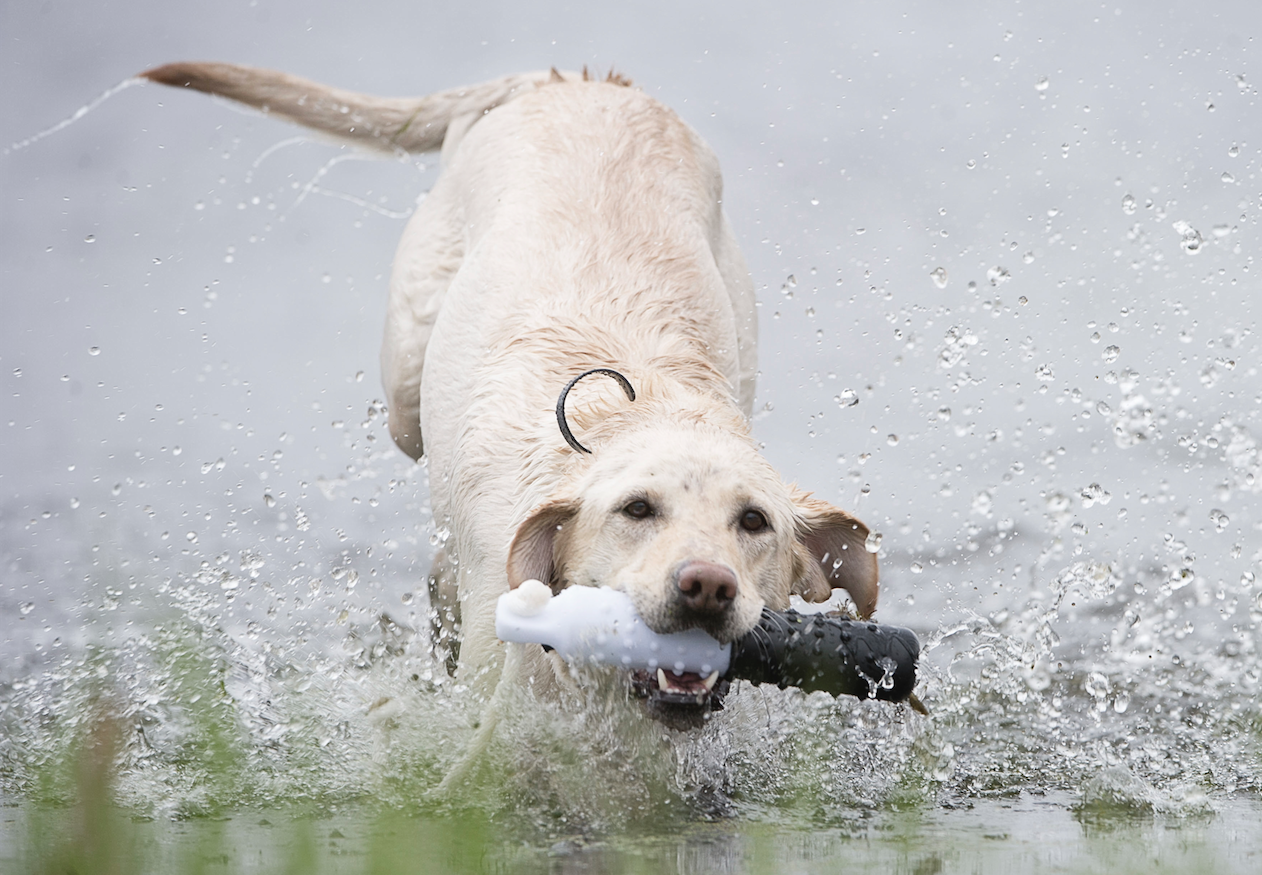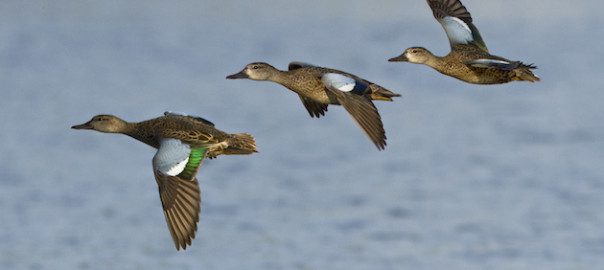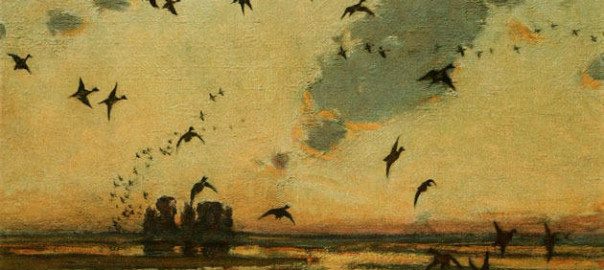”I’ve never seen them like this,” Helen said softly. “So many at once.”
“Like raindrops on a window,” Webster agreed. “I wonder what the ducks think when the stars are falling. ”
They watched in silence for a few minutes as the stars began to fade. Helen gestured with her shotgun toward the track of a last meteor as it disappeared across the western sky: “Go and catch a falling star…”
“Nicely Donne,” said Webster, deadpan, and Helen chuckled.
They had been playing at quotations since she arrived last night, partly for fun and partly to bridge the nervousness. He wanted very much for her to know this place. She knew his books already, and his books were what they had talked about when they had been together before, once over coffee after a seminar, once over dinner the next evening. It had been just emails and phone calls since, the seminar only a one-week arrangement at the university where she taught, his home here in Georgia a long way south of New England.
The sky was beginning to lighten toward the east. Webster checked his watch. “Five minutes, maybe a little more. I can just see the rosy-fingered dawn…”
“Homer,” she said, “but it doesn’t count in translation, you know.”
“Damn, I guess that rules out the ‘wine-dark swamp.’”
Helen looked up at him and smiled, her face pale and shimmering in starlight, a wisp of hair sneaking out from her cap. The wind began to rise with the gathering light, a slight, steady breeze moving up the creek, rustling the cattail stalks and dry grass along the banks of the beaver pond. Helen felt the cardboard numbness of her cheeks and the warm pockets of air trapped inside her coat and waders. The contrast was just sharp enough to be pleasant, she thought, a sharpened sense of a threshold. Looking up so long at the meteors had made her dizzy.
She felt light, detached, as though adrift among the paths of stars, moon, sun, the water and the wind. She closed her eyes and saw a retinal image of the dawn, faint pinks and deep, deep indigo, and tiny flashes that might have been the ghosts of falling stars. She heard the whisper of grass and the small chuckle of water spilling from the beaver dam behind them, and she felt, more than heard, the eager quivering of the dog perched on a hummock between them.
It surprised Helen a little to realize that even in her sense of floating untethered, she and Webster and the dog were most definitely floating together, fellow travelers of the edge.
A little surprised, perhaps, but not very. She had liked it when Webster had, without discussion, shown her to a room of her own when she arrived at the cabin last night. The liking was clear enough on both sides, but clear enough, too, that both wanted friendship first.
My goodness, she thought, amused, how very grown up. Actually wanting to like the one we love.
She opened her eyes at the sound of wings. Not ducks, she saw a single small blur flying upright like a quail, beak like an auger. “Woodcock!” she exclaimed softly. “But too early to shoot?”
“One more minute,” Webster replied. “They always know. I can’t remember ever seeing a legal woodcock over this pond. Get ready, though. The first ducks usually come right after.”
In the space of a minute the swamp around them became two worlds. At their feet the night still clutched black water, forming depth less hollows under the alders and fallen timber. Above the horizon, a pale pink wash, the moon sinking to the west, the unrisen sun spouting deeper reds across the eastern sky like fireworks at a processional; and from somewhere between water and sky, a wood duck’s cry, hanging like a question in the mist.
Helen shivered slightly, expectant, and felt the dog quiver against her leg.
“Four on the left,” Webster said, and she saw them too, black against pink, coming fast, swaying and dipping, nearly overhead.
“Now!” said Webster, and they swung up and up, her barrels covering the lead drake as she pulled, their shots together in overlapping waves of sound that crashed, rebounded; then the black parabolas of tumbling shapes, wisps of down and feathers trailing in the wind.
Helen lowered her gun as her eyes followed the duck down until it disappeared in a crash of alder branches. She looked at Webster, her face exultant.
He grinned back, bent next to the dog and pointed toward Helen’s duck: “Liza, back!”
The dog plunged and swam down the channel, circled behind the alders. They heard splashing and the crackle of briars, then Liza reappeared with the duck, her head just above the surface until she reached them and nudged the duck into Webster’s waiting hand. He stroked her head as she shook ice-cold droplets onto Webster and Helen with cheerful abandon, her tail wagging like a wet metronome.
Webster handed Helen her duck and pointed again for Liza: “Back!” and the dog headed into the brush upstream for Webster’s duck.
Helen was smoothing her drake’s feathers, touching the green crest, fluffing the tan herringbone pattern behind a wing, when Webster called “Ducks! Left!” and she turned and swung just barely ahead but enough. She watched it down, this one in plain sight, as Liza returned with Webster’s duck and then turned unbidden to pick up Helen’s second.
In ten minutes’ shooting Helen and Webster had six ducks between them, five neatly arranged by Liza in a fan around her hummock and one in her mouth.
“That’s it for the woodies,” said Webster as he took the last duck from Liza and put it on a lanyard.
Helen picked up the other ducks and helped Webster string them one by one through the lanyard’s loops dangling fore and aft across his shoulder. She thought about putting the loops around their feet to keep their necks unruffled, but they would hang too awkwardly, she decided, not really an improvement.
Webster watched her straighten the ducks just so, beaks facing left on one side, right on the other.
“And do we do hospital corners when we make our bed?” he asked, eyebrows aslant.
Helen laughed, but kept arranging, tucking in a wing, flicking leaves off feathers. “I just like them to look nice,” she said. “It’s better than all bedraggled.”
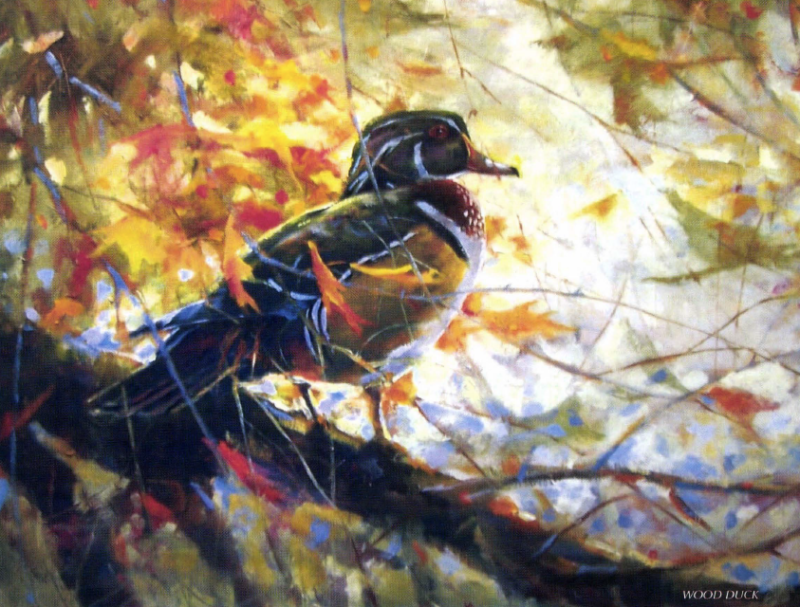
Wood Duck by Rod Crossman
The sun was up by the time they turned to walk out of the swamp. The occasional ducks that flew in, flared, and flew on seemed to sparkle as their colors caught the light.
Webster pointed to freshly chewed sticks scattered along the edge of the pond, each scored with tooth marks that showed white through the outer layer of bark. “They look just like little corncobs, don’t they?” he asked.
“They do.” Helen stopped to look at the cuttings and the dome-shaped lodge downstream. “You can just see the beaver family having a sweet little picnic around the lodge, fresh bark-on-the-cob, then everyone flosses.”
“Finest eating by a dam site…”
Helen groaned and rolled her eyes. From far down the swamp they heard a goose call, then another.
“Quick!” said Webster. “Have you still got shells?”
She nodded and they fumbled shells into their guns and turned to face the sounds, now shatteringly loud as a small flock of Canadas broke the treeline and dropped toward the pond. Helen picked out a goose, swung past the outstretched head and shot, then again as the goose jolted, tried to climb, then folded and fell with a smack Helen could feel through her waders.
Liza was already racing behind them after Webster’s goose, fallen in a long swoon until it collided with a tree in a burst of brown leaves and snow-like breast feathers.
Liza dragged the goose out of a thicket and brought it to Webster, then launched into the pond for Helen’s goose, returning considerably more slowly than she had gone out, tired at last. She lay down on the bank at Webster’s feet with the goose’s neck still in her mouth. Webster knelt beside her and took the goose with one hand as he rubbed her ears with the other.
“She’ll be eleven in May,” he said. “It’s hard to think of her getting old. She loves it too much not to bring her.”
When Liza was up and wagging again they loaded her into the back of Webster’s truck and drove back to the cabin. Webster had built an outdoor fireplace covered by a cedar-shake roof next to the cabin, and Liza lay down on the flagstones, still warm from last night’s fire, in front of the hearth. Webster and Helen shrugged off their waders and hung them to dry on the porch railings, then Helen went in to make coffee while Webster stoked the fire.
Liza, characteristically, had positioned herself to cause maximum obstruction. Webster made a point of nudging her head a little with one boot as he carried logs to the fire. Liza opened one eye just enough to acknowledge his point, closed it serenely and slept on.
“I wonder,” Webster said as Helen arrived with two mugs of coffee, “I really wonder whether it’s the dog in her or the female, but she has me completely figured out, takes shameless advantage of my undoubted good nature, and still manages to leave me grateful that she chooses to tolerate my faults.”
Helen settled into a rocker and propped her feet on the hearth. “I suspect it’s the dog,” she said gravely after some reflection. “I can ‘t imagine a woman leaving you with the impression that your faults are tolerable.”
Webster snorted, choked, spewing coffee and laughing. Helen patted him sympathetically on the back. “Sorry, Webster. I didn’t mean to make you spill your coffee. And I’m sure Liza knows you’re an angel.”
“I’m not so sure about that,” he said, still laughing. He sipped his coffee and thought about angels. Not very interesting, most of them, except maybe Blake’s.
“Do you know Blake’s poem about the angel, the thief and the lady?” he asked.
“I don’t think so. Can you do it from memory?”
“It goes like this:
“I ask’d a thief to steal me a peach:
He turned up his eyes.
I ask’d a lithe lady to lie her down:
Holy & meek she cries.
As soon as I went
An angel came:
He wink’d at the thief
And smil’d at the dame
And without one word said
Had a peach from the tree,
And still as a maid
Enjoy’d the lady.”
The fire blazed higher and Liza reluctantly dragged herself a few feet farther from the fire. Helen stood before the fire, moving slowly hack and forth, toasting herself like a crumpet, turning the little poem over in her mind. She turned, finally, to Webster as he stood looking into the flames. She wrapped her arms around him and laid her head on his chest just under his chin, and she listened to his heart. He held her head in his hands and ran his fingertips lightly along the line of her jaw and throat.
“Not exactly a maid,” she said softly, “but still…”

